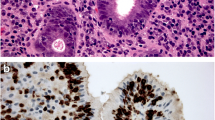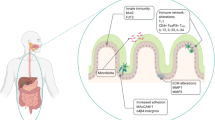Abstract
The objective of the present study was to determine the influence of cyclooxygenase-2 (COX-2) inhibition by Celecoxib (CLX) in humans with distal colorectal adenocarcinoma (CRC) on serum and tumor levels of progastrin and gastrin and serum levels of proinflammatory cytokines (IL-8, TNF-α). In addition, the effects of this CLX treatment on tumor and adjacent mucosa expression of gastrin, its receptors (CCK2), and COX-1 and COX-2, as well as protein expression of the active form of nuclear factor κ B (NFκ B) and the apoptotic-related proteins Bcl-2 and survivin, have been examined. Ten distal CRC patients were examined twice, once before and then after 14-day treatment with CLX (200 mg bid). Large biopsy samples were taken from the tumor and intact mucosa 10 cm above the tumor. For comparison, 20 age- and sex-matched healthy controls were enrolled and treated with CLX as CRC patients. Serum levels of IL-8 and TNF-α were measured by enzyme-linked immunosorbent assay, and serum levels of amidated gastrins and progastrin, by specific radioimmunoassay. The gene or protein expressions of progastrin, gastrin, CCK2, COX-1, COX-2, Bcl-2, and survivin as well as NFκ B were determined by RT-PCR or Western blot in biopsy samples of tumor and intact mucosa of CRC patients. Serum IL-8 and TNF-α values were severalfold higher in CRC patients than in controls. The increase in serum proinflammatory cytokines was accompanied by increased expression of the active form of NFκ B. Serum progastrin levels were also found to be significantly higher in CRC than in controls. Treatment of CRC with CLX resulted in a significant decrease in serum levels of progastrin and this was accompanied by an increment in tumor expression of COX-2 with a concomitant reduction in gastrin, Bcl-2, survivin, and NFκ B expression. We conclude that (1) distal CRC patients show significantly higher serum progastrin levels than matched healthy controls, confirming that this hormone may be implicated in rectal carcinogenesis; (2) CRC patients exhibit significantly higher serum levels of IL-8 and TNF-α than healthy controls, probably reflecting more widespread inflammatory reaction in the colonic mucosa in CRC; (3) gastrin, COX-2, Bcl-2, survivin, and NFκ B were overexpressed in CRC tumor compared to intact mucosa, but treatment with CLX significantly reduced serum levels of progastrin and IL-8 and TNF-α, which could mediate the up-regulation of COX-2 in CRC; and (4) CLX also enhanced expression of COX-2, while inhibiting the expression of gastrin, Bcl-2, survivin, and NFκ B, suggesting that COX-2 inhibition might be useful in chemoprevention against CRC, possibly due to suppression of the antiapoptotic proteins and reduction in progastrin-induced and NFκ B-promoted tumor growth.
Similar content being viewed by others
References
Landis SH, Murray T, Bolden S, Wingo PA: Cancer statistics 1998. CA Cancer J Clin 48:6–29, 1998
Jemal AT, Murray A, Samuels A, Ghafoor E, Ward, Rhun MJ: Cancer statistics. 2003 CA Cancer J Clin 53(1):5–26, 2003
Giovannucci E, Wilett WC: Dietary factors and risk of colon cancer. Ann Med 26:443–447, 1994
O’Brien MJ: The National Polyp Study: Patient and polyp characteristics associated with high grade dysplasia in colorectal adenomas. Gastroenterology 98:371–375, 1990
Eberhart CE, Coffey RJ, Radhika A, Giardiello, Ferrenback, DuBois RN: Up-regulation of cyclooxygenase 2 gene expression in human colorectal adenimals and adenoracinomas. Gastroenterology 1007(4):1183–1188, 1994
Konturek PC, Bielanski W, Konturek SJ, Hartwich A, Pierzchalsi P, Gonciarz M, Marlicz K, Starzynska T, Zuchowicz M, Darasz Z, Goetze J, Rehfeld JF, Hahn EG: Progastrin and cyclooxygenase-2 in colorectal cancer. Dig Dis Sci 47:1984–1991, 2002
Mueller-Decker K, Albert C, Lukanov T: Cellular localization of cyclooxygenase isoenzymes in Crohn’s disease and colorectal cancer. Int J Colorectal Dis 14:212–228, 1999
Dimberg J, Samuelsson A, Hugander A: Differential expression of cyclooxygenase 2 in human colorectal cancer. Gut 45(5):730–732, 1999
Sinicrope FA, Gill S: Role of cyclooxygenase-2 in colorectal cancer. Cancer Metastasis Rev 23:63–75, 2004
Thun MJ, Namboodiri MM, Heath CW Jr: Aspirin use and reduced risk of fata colon cancer. N Engl J Med 325(23):1593–1596, 1991
Giovannucci E, Rimm EB, Stampfer MJ, Colditz GA, Ascherio A, Wilent WC: Aspirin use and the risk for colorectal cancer and adenoma in male health professionals. Ann Intern Med 121(4):241–246, 1994
Giovannucci E, Egan KM, Hunter DJ, Stampfer MJ, Colditz GA, Wilett WC, Speizer FE: Aspirin and the risk of colorectal cancer in women N Engl J Med 333(10):609–614, 1995
Fenwick SW, Toogood GJ, Lodge JP, Hull MA: The effect of selective cyclooxygenase-2 inhibitor rofecoxib on human colorectal liver metastases. Gastroenterology 125:716–729, 2003
Rahme E, Barkun AN, Toubouti Y, Bardou M: The cyclooxygenase-2-selective inhibitors rofecoxib and celecoxib prevent colorectal neoplasis occurrence and recurrence. Gastroenterology 125:404–412, 2003
Peek RM Jr: Prevention of colorectal cancer through use of COX-2 selective inhibitor. Cancer Chemother Pharmacol 54 (Suppl 1):50–56, 2004
Johnson LR: Regulation of gastrointestinal mucosal growth. Physiol Rev 68:456–502, 1988
Sobhani I, Lehy T, Laurent-Puig P: Chronic endogenous hypergastrinemia in humans: evidence for a mitogenic effect on the colonic mucosa. Gastroenterology 105:22–30, 1993
Tukhar AS, Fremin O, Watson SA: The role of gastrin in colorectal carcinogenesis. Surgeon 2:251–257, 2004
Colucci R, Blandizzi C, Tanini M, Vassalle C, Breschi MC, Tacca MD: Gastrin promotes human colon cancer cell growth via CCK-2 receptor-mediated cyclooxygenase induction prostaglandin E(2) production. Br J Pharmacol 144:338–348, 2005
Yao M, Song DH, Rana B, Wolfe MM: COX-2 selective inhibition reverses the trophic properties of gastrin in colorectal cancer. Br J Cancer 87:574–579, 2002
Elder DJ, Halton DE, Hague A, Paraskeva C: Induction of apoptosis cell death in human colorectal carcinoma cell lines by cyclooxygenase-2 (COX-2)-selective nonsteroidal anti-inflammatory drug: independence from COX-2 protein expression. Clin Cancer Res3(10):1679–1683, 1997
Sheng H, Shao J, Kirkland SC, Isakson P, Coffey RJ, Morrow J, Beauchamp RD, DuBois RN: Inhibition of human colon cancer cell growth by selective inhibition of cyclooxygenase-2. J Clin Invest 99(9):2254–2259, 1997
Shiff SJ, Qiao L, Tsai LL: Rigas B: Sulindac sulfide, an aspirin-like compound, inhibits proliferation, causes cell cycle quiescence, and induces apoptosis in HT-29 colon adenocarcinoma cells. J Clin Invest 96:491–503, 1995
Piazza GA, Rahn AL, Krutzsch M, Sperl G, Paranka NS, Gross PH, Brendel K, Burt RW, Alberts DS, Pamukscu R: Antineoplastic drugs sulindac sulfide and sulfone inhibit cell growth by inducing apoptosis. Cancer Res 55(4):3110–3116, 1995
Sinicrope FA, Gill S: Role of cyclooxygenase-2 in colorectal cancer. Cancer Metastasis Rev 23:63–75, 2004
Yamamoto T, Yinn MJ, Lin KM, Gaynor RB: Sulindac inhibits activation of the NF-kappa B pathway. J Biol Chem 274:27307–27314, 1999
Lehman JM, Lemhard JM, Oliver BB, Ringlod GM, Kliewer SA: Peroxisome proliferator-activated receptors alpha and gamma are activated by indomethacin and other non-steroidal anti-inflammatory drugs. J Biol Chem 272:3406–3410, 1997
He TC, Chan TA, Vogelstein B, Kinzler KW: PPRdelta is an APC-regulated target of nonsteroidal anti-inflammatory drugs. Cell 99:335–345, 1999
Goel A, Dong KC, Ricciardiello L, Gasche C, Boland CR: A novel mechanism for aspirin—mediated growth inhibition of human colon cancer cells. Clin Cancer Res 9:383–390, 2003
Hartwich A, Konturek SJ, Pierzchalski P, Zuchowicz M, Labza H, Konturek PC, Karczewska E, Bielanski W, Marlicz K, Starzynska T, Lawniczak M, Hahn EG: Helicobacter pylori infection, gastrin, cyclooxygenase-2, and apoptosis in colorectal cancer. Int J Colorectal Dis 16:202–210, 2001
Bielański W, Konturek SJ: New approach to 13C urea breath test: capsule-based modification with low-dose 13C—urea breath test in the diagnostic of Helicobacter pylori infection. J Physiol Pharmacol 47:545–553, 1996
Breuer-Katschinki B, Nemes K, Marr A, Rump B, Leiendecker B, Breuer N, Goebell H: Helicobacter pylori and the risk of colonic adenomas. Colorectal adenoma study group. Digestion 60:210–215, 1999
Gerlag DM, Ransone L, Tak PP, Han Z, Palanki M, Barbosa MS, Boyle D, Manning AM, Firestein GS: The effect of a T cell-specific NF-kappa B inhibitor in vitro cytokine production and collagen-induced arthritis J Immunol 165:1652–1658, 2000
Kinzler KW, Vogelstein B: Lessons from hereditary colorectal cancer. Cell 87:159–170, 1996
Siddheshwar RK, Gray JG, Kelly SB: Plasma levels of progastrin but not amidated gastrin and glycine extended gastrin are elevated in patients with colorectal carcinoma. Gut 48:47–52, 2001
Ciccotosto GD, McLeish A, Hardy KJ, Shulkes A: Expression, processing, and secretion of gastrin in patients with colorectal carcinoma. Gastroenterology 109:1142–1153, 1995
Baldwin GS, Zhang QZ: Measurement of gastrin and transforming growth factor or α messenger RNA levels in colonic carcinoma cell lines by quantitative polymerase chain reaction. Cancer Res 52:2261–2267, 1992
Finley GG, Koski RA, Melhem MF, Pipas JM, Meisler AL: Expression of gastrin gene in the normal human colon and colorectal adenocarcinoma. Cancer Res 53:2919–2926, 1993
Smith AM, Watson SA: Review article: gastrin and colorectal cancer. Aliment Pharmacol Ther 14:1233–1247, 2000
Dockray G, Varro A, Dimaline R, Wang T: The gastrins. Their production and biological activities. u Rev Physiol 63:119–139, 2001
Goetze JP, Nielsen FC, Burcharth F, Rehfeld JF: Closing the gastrin loop in pancreatic cancer. Cancer 88:2487–2494, 2000
Caplin M, Khan K, Savage K, Rode J, Varro A, Michaeli D, Grimes S, Brett B, Pounder R, Dhillon A: Expression and processing of gastrin in hepatocellular carcinoma, fibroamellar carcinoma and colangiocarcinoma. J Hepatol 30:519–526, 1999
Singh P, Velasco M, Given R, Varro A, Wang TC: Progastrin expression predisposes mice to colon carcinomas and adenomas in response to chemical carcinogen. Gastroenterology 119:162–171, 2000
Biagini P, Monges G, Vuaroqueaux V, Parriaux D, Cantaloube JF, De Micco P: The human gastrin/cholecystokinin receptors: type B and type C expression in colonic tumors and cell lines. Life Sci 61(10):1009–1018, 1997
Alvy A, Shulkes A, Baldwin GS: Gastrins, cholecystokinins and gastrointestinal tumors. Biochim Biophys Acta 1701:1–10, 2004
Chulada PC, Thompson MB, Mahler JF, Doyle CM, Gaul BW, Lee C, Tiano HF, Morham SC, Smithies O, Langenbach R: Genetic disruption of Ptgs-1, as well as Ptgs-2, reduces intestinal tumorigenesis in Min mice. Cancer Res 60:4705–4708, 2000
Watson SA, Gilliam AD: G17DT–-a new weapon in the therapeutic armoury of gastrointestinal malignancy. Expert Opin Ther 1(2):309–317, 2001
Smith A, Justin T, Watson SA, Michaeli D, Broome P, Maxwell-Armstrong C: Clinical outcome of advanced colorectal cancer patients treated with anti-gastrin immunogen, gastrimmune. Br J Surg 85:1556, 1998
Ponelle T, Chapusot C, Martin L, Bouvier AM, Plenchette S, Faivre J, Solary E, Piard F: Cellular localization of survivin: impact on the prognosis in colorectal cancer. Cancer Res Clin Oncol (in press), 2005
Chen WC, Liu Q, Fu JX, Kang SY: Expression of survivin and its significance in colorectal cancer. World J Gastroenterol 10:2886–2889, 2004
Wu JT, Kral JG: The NF-kB/IkB signaling system: a molecular target in breast cancer therapy. J Surg Res123:158–169, 2005
Author information
Authors and Affiliations
Corresponding author
Rights and permissions
About this article
Cite this article
Konturek, P.C., Rembiasz, K., Burnat, G. et al. Effects of Cyclooxygenase-2 Inhibition on Serum and Tumor Gastrins and Expression of Apoptosis-Related Proteins in Colorectal Cancer. Dig Dis Sci 51, 779–787 (2006). https://doi.org/10.1007/s10620-006-3206-z
Received:
Accepted:
Issue Date:
DOI: https://doi.org/10.1007/s10620-006-3206-z




